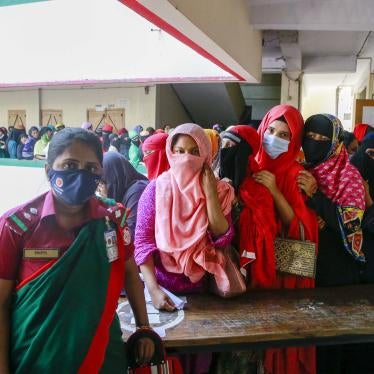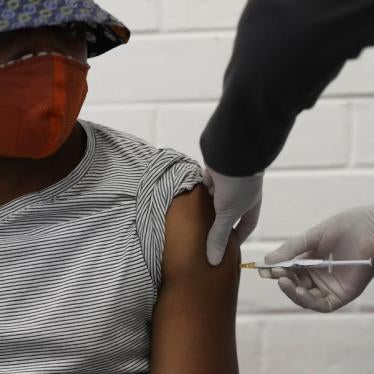The U.K. is using its power at the World Trade Organization to block measures to improve equitable access to lifesaving COVID-19 tests, treatments, and vaccines in the lead up to the June 12 WTO Ministerial Conference. For over 20 months, the U.K. and a handful of other high-income countries, have obstructed India and South Africa’s October 2020 proposal at WTO, co-sponsored by over 60 other countries, for a temporary waiver of some provisions of the Agreement on Trade Related Aspects of Intellectual Property Rights, or TRIPS.
This not only puts lives at risk globally, but also undermines people’s rights to health and an adequate standard of living. The U.K. Parliament, National Audit Office, and the wider British public should urgently scrutinize and help change the U.K.’s position.
The waiver as originally proposed was intended to improve affordable global access to COVID-19 health products, especially for low- and middle-income countries, by easing global rules that prevent governments’ efforts to expand and diversify manufacturing in various parts of the world.
Diversifying global manufacturing increases competition and reduces prices, helping governments do more with their existing health budgets, and equipping them to secure better access to tests, treatments, and vaccines at affordable prices that meet current and future demand.
Despite these benefits, which will have short- and long-term effects on people’s health and living standards worldwide, the U.K., along with other high-income governments, is staunchly opposing the waiver. Instead, it is supporting a watered down “non-waiver” alternative in the ongoing negotiations in Geneva undermining even the little room TRIPS allows for governments to issue compulsory licenses.
The alternative does not waive complex intellectual property rules, but merely clarifies how governments can issue compulsory licenses for patents, already permitted within TRIPS. In doing so, the suggested alternative is introducing more cumbersome rules, none of which are required under TRIPS. These additional rules would make an already complex global regime more unwieldy.
And while the proposed alternative would cover COVID-19 vaccines, it seeks to postpone decisions about whether COVID-19 tests and treatments should be included.
Instead, the U.K. should ensure that any outcome at WTO is a genuine waiver of intellectual property rules that impede wider access to tests, treatments, and vaccines.
The U.K.’s obstructive role is coming at a time when the omicron virus variant and its subvariants are fast spreading to more countries. Since the onset of the pandemic, some 15 million people have died due to COVID-19. Fewer than 18% of people in low-income countries have received even one dose of any vaccine. In May, new COVID-19 weekly infections increased in many parts of the world. Weekly deaths in the African region jumped by 48%.
Let’s look at COVID-19 testing. Domestically, the U.K. government stopped distributing free rapid COVID-19 tests on April 1, drawing widespread criticism. The health and economic ramifications of this regressive move, especially on those living in poverty and people with disabilities, are yet to be fully researched, but could be severe.
Access to testing in many parts of the world is far worse. Huge disparities in testing have been a continuing feature of the pandemic. The World Health Organization last October found that 6 out of 7 COVID-19 infections in Africa go undetected. Only 70 million COVID-19 tests had been administered on the African continent with a population of 1.3 billion people, while the U.K. had conducted over 280 million tests in a population less than 10% that size.
To both improve its own COVID-19 testing and testing in other countries, the U.K. should support the waiver to remove intellectual property rules that may lead to higher test prices or that impedes competition. The costs of opposing the waiver and introducing additional rules that undermine the flexibility governments have under TRIPS are significant for the U.K. as well as other countries, especially LMICs.
While spending cuts this year have already hurt low-income households in the U.K., the country has also cut funding for overseas assistance work that affects the ability of LMICs to address COVID-19 and tackle ongoing crises brought on by inflation and higher food and fuel costs.
Last July, the British government cut its aid budget from 0.7% to 0.5% of its gross national income. More recently, the U.K. halved its contribution to the World Bank’s International Development Association.
These aid cuts make it more important for the U.K. and other high-income countries to support the original waiver proposal, which would help drive down costs, and is especially important to do as the world reels with inflation and a historically high debt crisis.
The U.K. Parliament and the U.K. public should urge the government to reverse course at WTO and work to make tests, treatments, and vaccines more widely available and affordable as new COVID-19 virus variants emerge.
No one country’s people and economy can be fully protected until all countries have the tools to protect themselves against this infectious mutating virus. It bears repeating again and again — the pandemic and its impacts are not over.










